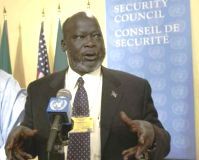Sudan’s Garang urges US to help peace implementation
WASHINGTON, Feb 11, 2005 (KUNA) — The leader of southern Sudans main rebel group met with high level US officials in Washington to discuss ways to improve the ongoing humanitarian needs and civil rift in Sudan, which has claimed millions of lives.

|
|
John Garang, head of the main Sudanese rebel group, speaks after the United Nations Security Council met in New York to discuss the situation in the Darfur, February 8, 2005. (Reuters). |
John Garang, leader of the rebel group the Sudan People’s Liberation Army, told KUNA on Friday he met with the Undersecretary of State for African Affairs and members of congress who offered their support to ending the prolonged conflict, but said no specific decisions were made in his discussions.
“My main message is we need to implement a peace agreement and people need to see peace dividends as quickly as possible,” said Garang.
He described the reception from US officials as “good and sympathetic”.
Garang, who will become vice president in Khartoum, warned the UN earlier this week as the focus of his US trip that the historic peace agreement signed in early January that declared an end to the conflict between north and south Sudan should be the groundwork for finding peace in war-ravaged Darfur.
Garang told the UN that agreements between the government of Sudan and his rebel group should be implemented without waiting for peace in Darfur, but he told KUNA the country cannot sustain peace with ongoing conflict in Darfur.
There has also been discussion about possibly placing Sudan under UN sanctions, but Garang said that sanctions would not solve the problem.
“The way to avoid sanctions is to stop killings in Darfur and to negotiate a fair and just settlement… If you do not solve this problem you will not solve them by sanctions,” said Garang.
Even if the Security Council threatens Sudan with sanctions, Chinas veto power on the Council would kill the proposal because the Asian superpower is deeply investing in Sudans oil, which is being exported to China.
And contrary to the argument that China has an interest in fueling the battle in Sudan, Garang said he does not believe China is doing so even though it is selling arms to the government of Sudan.
“A country like China with oil interests in Sudan wants peace,” he said.
The rebel leader did not blame countries, such as Chad that borders Darfur and China, for so-called meddling in Sudanese affairs and said it is up to the Sudanese people to ensure there is no foreign influence in domestic politics.
“It is our mistake to allow others to meddle in our affairs,” said Garang.
But Garang wants the worlds help in “reining in” the Janjaweed and other groups accused of carrying out atrocities in Darfur.
He wants action in Darfur and a robust force of 30,000 troops comprised of the African Union, the Sudanese Liberation Army and the Sudanese government to quell the violence.
He also wants unity in Sudan, while keeping in mind that southern Sudan can sustain itself as an independent country.
“The challenge is to make unity sufficiently attractive to the people… I believe that the bigger the country the better,” Garang said.
Another obstacle facing the rebel leader is acceptance by the Arab League, to which he submitted a request for an official observer status alongside the Sudanese government representative, he told KUNA.
To date, Garang has been invited by Egypt, Libya and Yemen and said he is not against the Arab world.
Politics aside, Garang is now most concerned with a predicted crop failure that may result in famine.
“We have more than 3 million displaced people coming home and no one is taking care of them,” he said.
